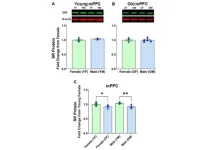(Press-News.org) Joint press release from Charité & University Hospital Cologne
How hard is it to stop taking antidepressants? If countless Internet posts and a number of scientific studies are to be believed, discontinuing these medications is highly problematic, and doctors often underestimate the difficulties involved. But it is unclear how common discontinuation symptoms actually are. Researchers from Charité – Universitätsmedizin Berlin and University Hospital Cologne have now conducted a systematic review and meta-analysis. In their article in The Lancet Psychiatry,* they conclude that one in three people reports symptoms after discontinuing antidepressant treatment, but half of those symptoms are attributable to negative expectations (the nocebo effect).
According to the formal definition, antidepressants are not habit-forming. Unlike “true” addictive substances, for example, taking them does not cause the body to require higher and higher doses to achieve the same effect. Even so, many patients report symptoms such as dizziness, headache, or insomnia when they stop taking these mood medications. The phenomenon went largely unremarked by researchers for years, but there are now a relatively large number of studies seeking to quantify the extent of discontinuation symptoms.
“The results of these studies vary, in some cases widely,” says Prof. Christopher Baethge, a researcher at the Department of Psychiatry and Psychotherapy at University Hospital Cologne and the Faculty of Medicine at the University of Cologne. “There has been a great deal of discussion, some of it quite emotional, within the research community and the general public alike in recent years about how prevalent and severe the discontinuation symptoms actually are.” A look at prescription figures shows just how relevant this topic is. According to the most recent Arzneiverordnungs-Report, which summarizes data on drug prescriptions, nearly 1.8 billion daily doses of antidepressants were prescribed in Germany in 2022.
Comprehensive meta-analysis brings clarity
To answer that question more reliably than before, a team led by Christopher Baethge and Dr. Jonathan Henssler, head of the Evidence-Based Mental Health research group at the Department of Psychiatry and Neurosciences at Charité, conducted a systematic review of existing studies and re-analyzed them in what is known as a meta-analysis. As the first study of its kind, it provides the soundest assessment to date of the consequences of stopping antidepressant treatment. “Our analysis shows that on average, one in three people will experience symptoms after stopping antidepressant treatment,” Henssler says. “However, only half of these symptoms are in fact attributable to the drug itself.”
For their paper, the researchers reviewed more than 6,000 studies. They then selected 79 of them and re-analyzed the results of those trials using statistical methods. In the end, they analyzed data on about 21,000 people, who had received either an antidepressant or a placebo and then been surveyed regarding the prevalence of discontinuation symptoms. Some 31 percent of the patients treated with an active drug reported discontinuation symptoms, but so did 17 percent of those who had received a placebo alone.
One in six or seven people experiences true discontinuation symptoms
“Drug effects can be ruled out in the placebo group, which means the symptoms either arose by chance, independently of the treatment, or they are the product of the nocebo effect,” Henssler explains. The nocebo effect is often considered the mirror image of the placebo effect. It explains the observation that inactive treatments can be associated with “side effects.” These effects are triggered purely by the expectation that the treatment that people think they are receiving will have negative effects.
“When we take non-specific symptoms and the effect of expectations into account, about one in six or seven people is affected by discontinuation symptoms that occur as an actual consequence of antidepressant medication,” Henssler says, summing up the study’s results. “In most cases, the symptoms are mild. The vast majority of those affected will be able to discontinue antidepressants without relevant symptoms. This means that in most cases, there is no need for a lengthy or gradual tapering process.”
Severe symptoms are rare
The study found that severe discontinuation symptoms are experienced by one in 35 people, or nearly three percent of those affected. These kinds of symptoms were more common after discontinuing treatment with the drugs imipramine, paroxetine, venlafaxine, and desvenlafaxine. There was not yet enough information on hand for the researchers to assess the situation for a number of widely used antidepressants.
As Baethge points out, “It’s important for all people wishing to discontinue treatment with antidepressants to be monitored and counseled by healthcare professionals and to receive individual support in the case of withdrawal symptoms. Joint decision-making between the patient and prescriber even before a course of treatment begins is the foundation of good treatment. We hope our data will support patients and healthcare professionals and help alleviate some of the uncertainty surrounding these issues today.”
About the study
The 79 studies considered in the meta-analysis included both randomized placebo-controlled trials and observational studies conducted without a control group. Of the 21,002 patients involved in the studies, 16,532 had received an antidepressant, and 4,470 a placebo. In addition to the researchers from Charité and University Hospital Cologne, researchers at the Medical Center – University of Freiburg and University Hospital Carl Gustav Carus, in Dresden, were involved in the meta-analysis.
*Henssler J., Schmidt Y., Schmidt U., Schwarzer G., Bschor T., Baethge C. Incidence of Antidepressant Discontinuation Symptoms – A Systematic Review and Meta-Analysis. Lancet Psychiatry 2024 Jun 05. doi: 10.1016/S2215-0366(24)00133-0
END
Antidepressants: new data on prevalence of discontinuation symptoms
Expectations contribute to symptoms following discontinuation of antidepressants
2024-06-06
ELSE PRESS RELEASES FROM THIS DATE:
Scientists question effectiveness of nature-based CO2 removal using the ocean
2024-06-06
Limited understanding of basic ocean processes is hindering progress in marine carbon dioxide removal, with the on-going commercialisation of some approaches “premature and misguided”.
In a new paper, scientists from the University of East Anglia (UEA), the University of Tasmania’s Institute for Marine and Antarctic Studies, Centre National de la Recherche Scientifique, and the Institute for Sustainable Development and International Relations, review the climatic effectiveness of four 'nature-based' techniques using marine biological processes.
These involve shellfish cultivation, seaweed ...
Minimum pricing for alcohol helped curb demand during COVID lockdown
2024-06-06
Minimum pricing can be very effective in reducing demand for cheap high-strength alcohol amid concerns about affordability fuelling problematic drinking - according to a study on the impact of the measure during the COVID lockdown.
The research, led by the University of East Anglia (UEA), examined the efficacy of minimum unit pricing (MUP) to help curb excessive consumption following the outbreak of the pandemic in 2020.
As a flat-rate form of minimum prices applying to all alcohol products based on their ...
New home-administered treatment for binge eating disorder shows promising results
2024-06-06
Researchers from the Institute of Psychiatry, Psychology & Neuroscience (IoPPN) at King’s College London have investigated the feasibility of a new home-administered treatment for binge eating disorder. The new treatment combines a gentle brain stimulation technique called transcranial direct current stimulation (tDCS) with a training programme that targets unhelpful patterns of attention around food.
The findings, published in BJPsychOpen, indicate that this might be a welcome new avenue for treatment.
Binge eating disorder (BED) is a serious mental illness that can affect anyone of any age, gender, ethnicity or background. People ...
Nuclear medicine highlighted in documentary series
2024-06-06
Reston, VA—The field of nuclear medicine is in the spotlight this season on the TV documentary Jobs of Tomorrow. The series, hosted by Kristin Marand, explores how technology and innovation drive the changing job market and impact the workforce.
Six episodes of this season of Jobs of Tomorrow highlight the many facets of nuclear medicine and the Society for Nuclear Medicine and Molecular Imaging (SNMMI) members currently working in the profession.
Nuclear medicine is a multidisciplinary field that encompasses physicians, chemists, physicists, pharmacists, and technologists—all ...
Serine racemase expression in the brain during aging in male and female rats
2024-06-05
“The findings of the present study reveal that aging is linked to a decline in serine racemase protein levels across various brain regions [...]”
BUFFALO, NY- June 5, 2024 – A new research paper was published in Aging (listed by MEDLINE/PubMed as "Aging (Albany NY)" and "Aging-US" by Web of Science) Volume 16, Issue 10, entitled, “Serine racemase expression profile in the prefrontal cortex and hippocampal subregions during aging in male and female rats.”
Aging is associated with a decrease in N-methyl-D-aspartate (NMDA) receptor ...
Virginia Tech researcher helps reach nutrition security goals
2024-06-05
Food is many things.
It nourishes our bodies, delights our senses, and gives us something to gather around. Food is also a powerful cultural symbol, reflecting traditions, values, and histories of communities around the world.
But for a researcher in the College of Agriculture and Life Sciences, food is also medicine.
Bailey Houghtaling Ph.D. ’19, a registered dietician, is working to promote overall wellness among low-income individuals experiencing food insecurity, aiming to prevent or treat diet-related diseases.
“Access to enough nutritious food is essential for individual well-being,” ...
William T. Grant Foundation announces funding for UT, Cherokee Health Systems for research-practice partnership
2024-06-05
Trustees of the William T. Grant Foundation, the Spencer Foundation, the Doris Duke Foundation and the Bezos Family Foundation have approved funding for the winners of the 2024 Institutional Challenge Grant competition. The University of Tennessee, Knoxville, and Cherokee Health Systems will receive $650,000 to grow their unique research-practice partnership — and to learn how to implement community-engaged scholarship that results in ongoing positive outcomes.
UT has a long history of working with CHS, a federally qualified ...
Democratizing plant research: A new cost-effective solution for advanced phenotyping
2024-06-05
Phenotyping, which involves assessing observable plant characteristics, is crucial for understanding plant development and response to environmental stresses. Traditional methods are often cumbersome, costly, and destructive, limiting research scope and scale. A new system of affordable, mobile, and high-throughput phenotyping tools is making the technology accessible to a wider range of users.
The "all-in-one" solution, developed by a team at the Boyce Thompson Institute (BTI), includes low-cost hardware designs, data processing pipelines, and a user-friendly data analysis ...
Multiple randomized trials prove more stroke patients can benefit from thrombectomy
2024-06-05
FOR IMMEDIATE RELEASE: June 5, 2024
CONTACT: Faith James
fjames@vancomm.com or 202-248-5450
Multiple Randomized Trials Prove More Stroke Patients Can Benefit from Thrombectomy
Society of NeuroInterventional Surgery issues update to standards and guidelines following research in favor of minimally invasive procedure for deadly type of stroke
FAIRFAX, Va. — Access to thrombectomy should be expanded to include patients who experience basilar artery occlusion (BAO), a deadly type ...
Researchers led by UMass Amherst solve 2,000-year-old mystery of the shipworm
2024-06-05
June 5, 2024
Researchers Led by UMass Amherst Solve 2,000-Year-Old Mystery of the Shipworm
Secret of the world’s most destructive and intriguing mollusk has implications for everything from climate change to human health
AMHERST, Mass. – They bedeviled ancient Greek navies, helped shipwreck Christopher Columbus, aided in the sinking of the Spanish Armada and caused the wharves in San Francisco Bay to collapse into the sea, but until now, scientists have been unable to pinpoint exactly ...
LAST 30 PRESS RELEASES:
Antarctica sits above Earth’s strongest “gravity hole.” Now we know how it got that way
Haircare products made with botanicals protects strands, adds shine
Enhanced pulmonary nodule detection and classification using artificial intelligence on LIDC-IDRI data
Using NBA, study finds that pay differences among top performers can erode cooperation
Korea University, Stanford University, and IESGA launch Water Sustainability Index to combat ESG greenwashing
Molecular glue discovery: large scale instead of lucky strike
Insulin resistance predictor highlights cancer connection
Explaining next-generation solar cells
Slippery ions create a smoother path to blue energy
Magnetic resonance imaging opens the door to better treatments for underdiagnosed atypical Parkinsonisms
National poll finds gaps in community preparedness for teen cardiac emergencies
One strategy to block both drug-resistant bacteria and influenza: new broad-spectrum infection prevention approach validated
Survey: 3 in 4 skip physical therapy homework, stunting progress
College students who spend hours on social media are more likely to be lonely – national US study
Evidence behind intermittent fasting for weight loss fails to match hype
How AI tools like DeepSeek are transforming emotional and mental health care of Chinese youth
Study finds link between sugary drinks and anxiety in young people
Scientists show how to predict world’s deadly scorpion hotspots
ASU researchers to lead AAAS panel on water insecurity in the United States
ASU professor Anne Stone to present at AAAS Conference in Phoenix on ancient origins of modern disease
Proposals for exploring viruses and skin as the next experimental quantum frontiers share US$30,000 science award
ASU researchers showcase scalable tech solutions for older adults living alone with cognitive decline at AAAS 2026
Scientists identify smooth regional trends in fruit fly survival strategies
Antipathy toward snakes? Your parents likely talked you into that at an early age
Sylvester Cancer Tip Sheet for Feb. 2026
Online exposure to medical misinformation concentrated among older adults
Telehealth improves access to genetic services for adult survivors of childhood cancers
Outdated mortality benchmarks risk missing early signs of famine and delay recognizing mass starvation
Newly discovered bacterium converts carbon dioxide into chemicals using electricity
Flipping and reversing mini-proteins could improve disease treatment
[Press-News.org] Antidepressants: new data on prevalence of discontinuation symptomsExpectations contribute to symptoms following discontinuation of antidepressants





